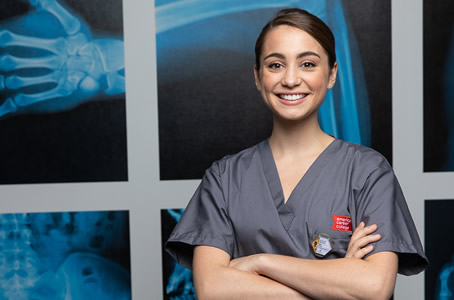- Home
- Programs[+]
- Getting Started[+]
- Why ACC[+]
- Locations[+]
- Newsroom[+]
- Contact Us

Discover a career that helps people. As the population grows older, there will be an increase in medical conditions, such as breaks and fractures caused by osteoporosis, which can require imaging to diagnose them.
More Radiologic Technologists will be needed to maintain and use the diagnostic equipment. The Radiography program at American Career College can help you start a career as a certified radiologic technologist.
This program is taught in a blended format combining online classes and in-person instruction.
Want to learn more about ACC?REQUEST MORE INFO Want to check out a campus?SCHEDULE A CAMPUS TOUR
Radiography is a dynamic discipline that requires growth, personally and professionally, to better prepare for future needs of the profession. These needs may vary in many ways, dependent on the environment where one is employed, and across the profession as it changes.
The profession of radiology is guided by the ASRT and ARRT Code of Ethics. It is the expectation of the College that each of our school's graduates, following successful completion of the certification and registration exam, will work within legal and ethical boundaries. This responsibility requires dedication to applying standards that are outlined within the Code of Ethics for the Radiologic Technologist.
The Radiography program provides the requisite knowledge and skills to pursue a career as an entry level Radiologic Technologist.
The Radiography (Associate of Occupational Science) program at the American Career College Ontario campus is approved by the California Department of Public Health, Radiologic Health Branch (CDPH-RHB).
Department of Public Health Radiologic Health Branch
1500 Capitol Avenue, 5th Floor, MS 7610
Sacramento, CA 95814-5006
Phone: 916-327-5106 / Fax: 916-440-7999 / www.cdph.ca.gov
Radiologic Technologists work in a variety of healthcare facilities from hospitals to outpatient care. Radiologic Technologists help physicians and other health care professionals by preparing patients for examinations and performing diagnostic imaging examinations, such as X-rays, on patients.
The industries that employed the most radiologic technologists in a recent review were1:
1Bureau of Labor Statistics, U.S. Department of Labor, Occupational Outlook Handbook, Radiologic and MRI Technologists
This Radiography program is designed to provide learning experiences that prepare our school's students for competent performance as a radiologic technologist. These include, but are not limited to: lecture, interactive and self-discovery activities, problem-based case presentations, small group discussions, mentoring, tactile/kinesthetic activities provided through laboratory experiences and clinical practicums.
What courses make up the Radiography program?
General Education Courses:
Core Radiography and Other Courses:
American Career College Provides comprehensive academic and clinical preparation for each student to have a successful result on the ARRT certification and registration exam.
Our school's goal is to graduate professionals that enthusiastically display leadership responsibilities while providing competent care. We accomplish this by:
Classes Equipment List
Radiologic Technologists perform diagnostic imaging examinations, such as X-rays, on patients.
Radiologic Technologists typically perform the following tasks:1
Health care professionals use many types of equipment to diagnose patients. Radiologic Technologists specialize in X-ray, and computed tomography (CT) imaging. Some radiologic technologists prepare a mixture for the patient to drink that allows soft tissue to be viewed on the images that the radiologist reviews. Radiologic technologists might also specialize in mammography. Mammographers use low-dose X-ray systems to produce images of the breast. Technologists may be certified in multiple specialties.
ACC’s Radiography Program is designed to provide students with a solid foundation in radiographic techniques, patient care and medical imaging technology. The curriculum is continuously updated to align with the latest advancements in radiology, ensuring that students are prepared to meet the demands of modern healthcare settings.
The goal of radiologic technologist school is to graduate professionals that enthusiastically display leadership responsibilities while providing competent care. ACC accomplishes this by:
ACC helps program graduates earn their radiography associate degree and get ready to provide compassionate patient care.
Radiologic technologists are responsible for maintaining and operating the equipment that takes effective x-rays and other diagnostic imaging examinations. They work hands-on with patients to ensure that their doctors see what they need to see.
Here are some things a radiologic technologist does:
If you love working with technical equipment and enjoy working directly with people, our Radiography program might be right for you.
Here are some of the top skills and attributes that make for a great radiologic technologist:
Active listening – A good radiologic technologist listens to their patients and understands their needs and concerns.
Communication – Because radiologic technologists work directly with patients, they must be able to communicate effectively with them, explaining the postures and procedures used during imaging.
Operations monitoring – Radiologic technologists should be able to monitor any relevant machinery, including watching gauges, dials or other indicators.
Customer and personal service – Radiologic technologists work directly with patients. Having good customer and personal service skills helps them provide better care.
Service orientation – A great radiologic technologist has a passion for helping patients and for providing the best care possible.
Radiologic technologists can work in a variety of settings, including:
ACC's Radiography program is designed to provide learning experiences that prepare our school's students for competent performance as a radiologic technologist. These include, but are not limited to: lecture, interactive and self-discovery activities, problem-based case presentations, small group discussions, mentoring, tactile/kinesthetic activities provided through laboratory experiences and clinical practicums.
What courses make up the Radiography program?
General Education Courses:
Introduction to Anatomy and Physiology Classes & Lab
Written Communications I
College Mathematics I
Introduction to Psychology
Core Radiography and Other Courses:
Introduction to Radiologic Sciences
Medical Terminology
Radiographic Physics
Principles of Image Production
Patient Care
Radiographic Positioning I
Principles of Radiation and Radiation Biology
Radiation Protection
Clinical Practicum I
Radiographic Positioning II
Digital Imaging
Clinical Practicum II
Law and Ethics in Imaging
Radiographic Positioning III
Clinical Practicum III
Clinical Practicum IV
Introduction to Computed Tomography
Clinical Practicum V
Cross-Sectional Anatomy
Pharmacology/Venipuncture
Clinical Practicum VI
Career Advantage
Radiology Seminar
American Career College provides comprehensive academic and clinical preparation for each student to have a successful result on the ARRT certification and registration exam.
For a complete description of coursework in these modules, please refer to the ACC Catalog.
Students can earn their radiography associate degree in as little as 25 months.
Our admissions advisors and financial aid advisors are here to support you. They can help you figure out the radiography school cost and help you explore financial aid options.
To learn more about ACC’s Radiography program cost, access our tuition info.
Yes, financial aid and scholarships are available for those who qualify.
Yes! ACC's Radiography program includes over 1,800 hours of clinicals which gives students the opportunity to demonstrate and reinforce the knowledge and skills they acquired learning hands-on throughout the training program.

Ontario Campus: Voted Best Trade School in the 2021 Inland Valley Daily Bulletin Readers Choice Awards

LA Campus: Voted Favorite Career College in the 2021 LA Daily News Readers Choice Awards.

OC Campus: Voted Best Career College in the 2021 San Gabriel Valley Tribune Readers Choice Awards.
Personal Information you submit through our Sites, such as your name, address and other contact information, may be collected by American Career College for internal marketing and development purposes as well as to respond to your inquiry, complete a transaction for you, or fulfill other forms of customer service. You can choose not to receive marketing from us by "unsubscribing" using the instructions in any marketing email you receive from us.
